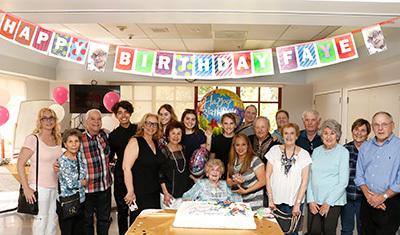Celebrating 106 Years of Positive Living


Celebrating 106 Years of Positive Living
What is the secret to living to 106? According to Jewish Home resident Faye Levitt, "It's part luck and part the way you are. You have to be happy with yourself and have a good attitude and good friends." Last week, luck, attitude and friendships brought Faye to her 106th birthday, which she celebrated with family and friends.
Held at the Home's Grancell Village Campus, the party was a collaborative effort of Faye's family and the activities department of the Mark Taper Building where Faye resides. The room was festively decorated for the occasion with pastel balloons, floral centerpieces and a Happy Birthday banner featuring photos of Faye. A beautiful cake tempted everyone until Faye did the honors of making the first slice. As a member of the activities staff played Happy Birthday on a baby grand piano, everybody sang along, wishing Faye all the best and many, many more. A self-confessed "shopaholic," Faye was glowingly beautiful in a new blue top and her hair freshly coiffed.
The youngest of five children, Faye was born in Philadelphia, Pennsylvania, to Anne and Harry Reader, who were from Austria. Anne and Harry moved their family to Galveston, Texas to open a jewelry store. Though business was good, sometimes the town would flood, with water entering their store and rising to the bottom of the safe. A friend suggested they consider moving to Taft, California, near Bakersfield. At the time, Taft was a booming oil town, so the family packed up and relocated. As she got older, Faye loved getting dressed up and going to work in the store, something she would do for decades to come. To this day, she still takes great care to always look her best.
Another family move brought everyone to Santa Monica, where a new store was opened. It was in Los Angeles that Faye met her husband-to-be, Ben, through a girlfriend. After dating for one year, they married and went on to have two children, Ken and Myrna. Now Faye's family includes four grandchildren and three great-grandchildren, all living nearby. She is also the only – and favorite - aunt to the thirteen children and grandchildren on Ben's side of the family, many who were on hand to celebrate her birthday. "She has become mother to all my friends as their own mothers have passed away," exclaims Myrna.

Throughout their marriage, Faye and Ben worked together in the store and enjoyed traveling with a group of friends, visiting Israel, Spain, France, England, Italy…and Vegas. When he was 85, Ben passed away, and Faye, who was 75, began living on her own in an apartment in Encino. There she made friends with a group of women and they did a lot of fun things together, including barbecuing at Faye's place.
When she was 93 and had to give up driving, Faye moved to an assisted living facility where she lived for about 14 years. As always, she made a lot of friends and enjoyed socializing. Although she has never had a serious illness or surgery, she began to need more care. Ken and Myrna suggested the Jewish Home. "The Home was recommended to us by so many people," explains Myrna. "And it is a wonderful place! Since coming here, our mother is eating better, exercising, participating in activities, and attending Shabbat and holiday services."
"With our mom living here at the Home, we know she is taken care of and we don't have to worry," says Ken. "I feel lucky to have my mom with us at 106! She's smart, sharp, has a great memory and sense of humor. It's amazing what she has experienced and seen in her lifetime."
Though she's only been at the Home for a few months, Faye encourages others to consider making the move. "It's made a big difference in my life," she says. "As you get older, it's better to be around other people than to be living in a place by yourself. It gives you the opportunity to communicate with others. Here at the Home, the care is great, the employees are wonderful and the food is good!"
Reflecting on her 106th birthday celebration, Faye "is elated! I see all my relatives and friends and it's a pleasure. I'm happy to be able to enjoy this because it's not usual that a person my age would be able to experience this. I am thankful to my family and the Jewish Home staff for making this party so wonderful!"
On behalf of the Jewish Home, mazel tov to Faye on this milestone occasion. We wish her good health and happiness in the years to come.
To see more photos of Faye's 106th birthday celebration, click here.